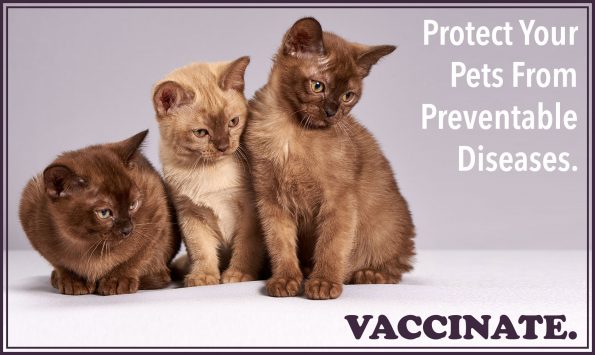
August is National Immunization Awareness Month! Vaccines play an important role in your pet’s health. Vaccines are products designed to trigger protective immune responses and prepare the immune system to fight future infections from disease-causing agents. Vaccines stimulate the immune system’s production of antibodies that identify and destroy disease-causing organisms that enter the body. No vaccine is 100% effective but they can lessen the severity or prevent certain diseases altogether.
5 reasons to vaccinate your pet:
- Vaccinations prevent many pet illnesses.
- Vaccinations can help avoid costly treatments for diseases that can be prevented.
- Vaccinations prevent diseases that can be passed between animals and also from animals to people.
- Diseases prevalent in wildlife, such as rabies and distemper, can infect unvaccinated pets.
- In many areas, local or state ordinances require certain vaccinations of household pets.
Are there risks? Any type of medical treatment has associated risks, but the risk should be weighed against the benefits of protecting your pet, your family and your community from potentially fatal diseases. The most common adverse responses to vaccination are mild and short-term. Serious reactions are rare. Side effects of vaccines are discomfort and local swelling at the vaccination site, mild fever, decreased appetite and activity. Sneezing, mild coughing, “snotty nose” or other respiratory signs may occur 2-5 days after your pet receives an intranasal vaccine, like Bordetella. More serious but less common vaccine reactions include persistent vomiting or diarrhea, hives, swelling of the muzzle and around the face, neck, or eyes, severe coughing or difficulty breathing. If you notice any of these reactions, call your veterinarian immediately. Very young animals are highly susceptible to infectious disease because their immune system is not yet fully mature and require several booster vaccines 3 weeks apart. For more information on vaccines, click the link below. If you would like to find out more about which specific vaccines your pet needs, please call us at 706-629-5060 or email us at askbfah@gmail.com.
